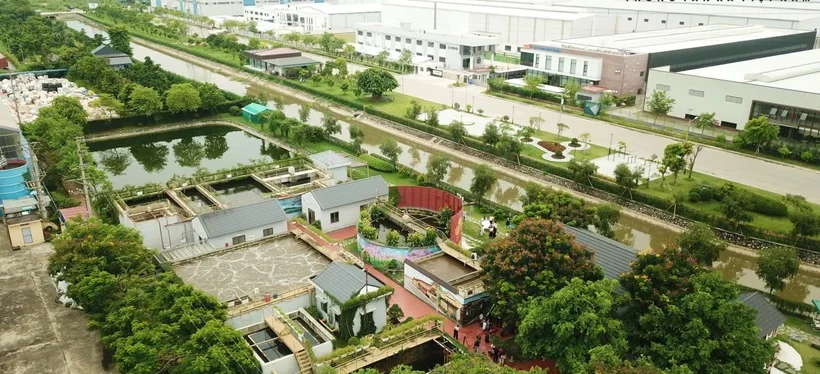WNAM REPORT: The development of eco-industrial parks (eco-IPs) is an effective solution to lower emissions enough to meet the net zero target by 2050 in Vietnam. However, there are still many obstacles, especially in terms of mechanisms.
The rapid development of industrial parks in recent times has put great pressure on the living environment of residents, according to Vuong Thi Minh Hieu, Deputy Director General of the Department of Economic Zone Management (DEZM) under the Ministry of Planning and Investment (MPI).
Up to 13% of operating IPs have not built wastewater treatment plants, threatening the health of the surrounding communities, she noted.
Hieu held that sustainable development is no longer a slogan, but has become an inevitable trend that helps enterprises determine their vision and strategic business orientation, thus many localities and IP infrastructure investors consider forming eco-IPs an urgent need to create competitive advantages.
Furthermore, the development of eco-industrial parks and green industrial parks has also become a mandatory requirement to meet green consumption needs and fulfill the commitment at the 26th United Nations Climate Change Conference (COP26) to achieve the goal of net zero emissions by 2050.
By 2030, the country aims for 40-50% of localities to convert existing IPs into eco-IPs and 8-10% of localities have orientations to build eco-IPs right in their plan making.
The Swiss Government has pledged to continue working with the United Nations Industrial Development Organisation (UNIDO) to accompany Vietnam in promoting eco-industrial parks associated with the circular economy in the 2024-2028 period, according to DEZM.
Its project, approved by the MPI in August, replicates the eco-industrial park approach to promote the circular economy in Vietnam and has a total budget of 3.6 million USD, which is sponsored by the Swiss Federal Department of Economic Affairs, Education and Research (EAER). The projected eco-industrial parks are to be transitioned in Hai Phong, Bac Ninh, Dong Nai, Ho Chi Minh City and Long An.
The MPI is coordinating with the World Bank to support the construction of eco-IPs in Binh Duong, carry out water circulation networks for several industrial parks with a high concentration of textile and garment activities in Hung Yen and Thua Thien Hue. The goal is to promote the efficient use of energy in the eco-IPs following the Korean model.
Bruno Jaspaert, Executive Director of the Deep C Industrial Park in Hai Phong, said Vietnam does not have preferential policies specifically for developing eco-IPs, thus it will take time and efforts to build these zones.
The research and development of the Law on Industrial Parks and Economic Zones to ensure the enhancement of international competitiveness of industrial park and economic zone models is one of the key tasks that the MPI will implement together with other ministries, agencies, and localities in the coming time, Hieu said.
According to her, IPs must pioneer changing the direction of development, focusing on promoting the development of eco and green industrial park models. Science, technology, and innovation should be considered a pillar for future development. Focus should be placed on attracting selective investment, and proactively contacting and closely following the world’s leading corporations in the industries and fields that Vietnam prioritises.


